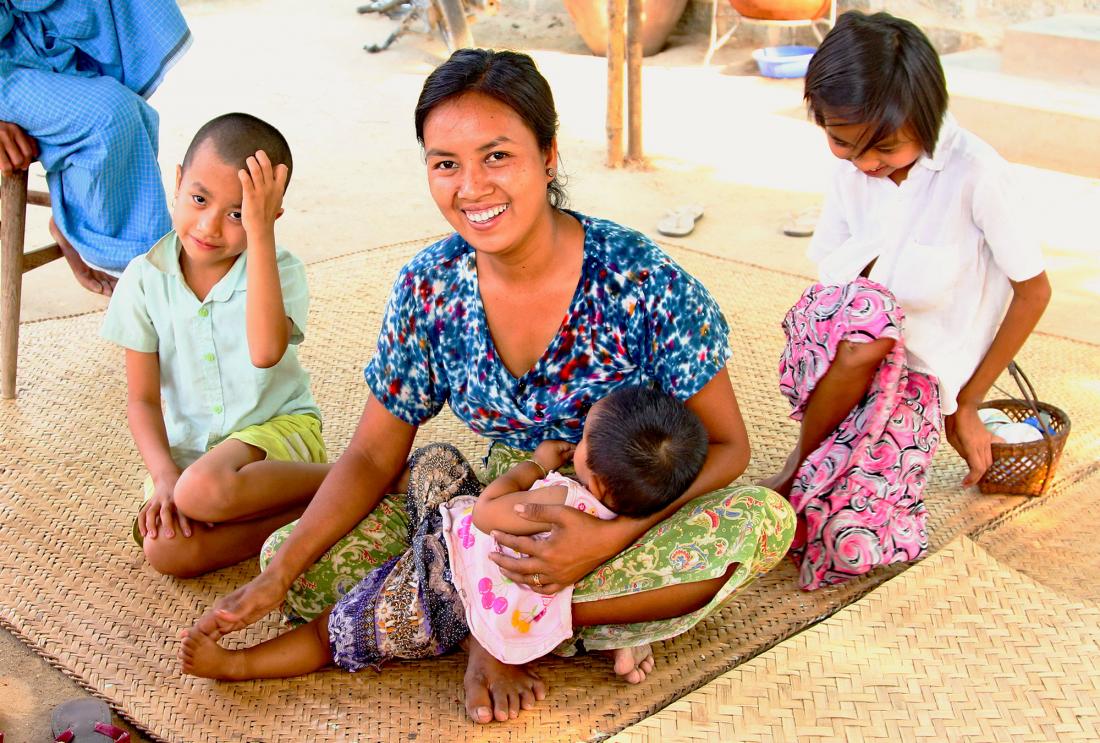The Health Impacts and Effective Delivery of Maternal Cash Transfers in Myanmar
- Children under five
- Mothers and pregnant women
- Women’s/girls’ decision-making
- Gender attitudes and norms
- Food security
- Nutrition
- Cash transfers
- Information
- Preventive health
- Conditional cash transfers
- Unconditional cash transfers
When children do not receive adequate nourishment in the first years of life, it can impair their physical and cognitive development and have long-term consequences on their earnings and productivity. In Myanmar, which has one of the highest rates of stunting in the Asia-Pacific region, Innovations for Poverty Action is working with researchers to evaluate the impact of maternal cash transfers and nutritional information on child malnutrition. In addition, researchers are testing whether delivering cash through governmental institutions or through an existing MFI is more cost-effective and easier to scale-up.
Policy issue
The first 1,000 days of life comprise a critical period of physical and cognitive development. Children who are well-nourished during this period do better in school and as adults, earn 20 percent more in the labor market and are 10 percent more likely to own their own businesses.1 On the other hand, inadequate nutrition during this period can cause stunting, lead to long-term developmental consequences, and affect future productivity and earning potential. According to the World Bank, the economic costs of stunting can be enormous, with countries losing between 2 to 3 percent of their potential Gross Domestic Product (GDP) each year.2
One promising response to address stunting is through cash transfers. Targeting cash transfers to women and young children may improve child nutrition, reduce stunting, and yield high returns over the long term, yet more research is needed on the impacts of this approach and on what extent information and behavior change interventions should be incorporated into these programs. Furthermore, questions remain about the effective implementation of large-scale cash transfer programs and which institutions can most effectively deliver the transfers.
Context of the evaluation
Myanmar has one of the highest rates of stunting in the Asia Pacific region. Nearly a quarter of children are born moderately or severely underweight and 35 percent of children under five are moderately or severely malnourished.3 In December 2014, the Government of Myanmar announced it would launch a universal maternal cash transfer program for pregnant women and women with children under age two as part of its National Social Protection Strategy. The program is projected to reach 2.25 million beneficiaries by 2024. This study, conducted in collaboration with Save the Children International (SCI), will take place in three townships in Myanmar’s Dry Zone during the pilot phase of the program. Results are expected to inform the national roll-out of the program.

Details of the intervention
Innovations for Poverty Action is working with researchers to measure the impact of maternal cash transfers and providing nutritional information on many aspects of child malnutrition, household economic welfare, and women’s empowerment. These include stunting, wasting, underweight status, morbidity, diet and food diversity, breastfeeding practices, use of healthcare services and immunizations, consumption patterns, income, and women’s desired fertility and financial involvement.
Researchers will randomly assign 102 sub-rural health centers catchment areas (group of villages, for a total of 437 villages) in three townships to one of three groups:
- Cash only: Eligible pregnant mothers receive a monthly unconditional cash transfer during pregnancy and through the child’s first two years of life (first 1,000 days). The transfer of 10,000 Myanmar kyats (about US$8) per month is designed to ensure the women are able to afford the purchase of nutritious foods and access antenatal and post-natal care. These women will receive simple nutritional pamphlets at the point of payment only.
- Cash and behavioral change component: Eligible pregnant mothers receive the monthly maternal cash transfer along with an intensive informational campaign. The campaign is designed to encourage beneficiaries to use healthcare and to ensure they receive potentially helpful nutrition information. The campaign promotes attendance at nutrition and hygiene promotion sessions, attendance to ante- and post-natal services, and child immunization. However, non-compliance does not exclude the beneficiaries from the program.
- Comparison group: Eligible pregnant mothers in areas where the intervention will not be implemented.
In addition, in one of the three townships where the cash transfer program will be implemented, researchers will test whether delivering cash through governmental institutions or an existing MFI is more cost-effective and easier to scale-up. An expected 80 villages will be pair-matched to one of the following two models of delivery:
- Government model: A midwife from each sub-rural government health center will enroll and disburse the cash to the pregnant mothers from their coverage villages. SCI and Myanmar Nurses and Midwives Association (MNMA) will provide technical support to the health departments in the disbursement of the cash.
- MFI model: An existing MFI (PACT) will deliver the cash. While they will still utilize MNMA to enroll and validate enrollment, the cash will be delivered directly to recipients by the MFI.
The MFI model is expected to be a more reliable way to deliver cash because MFIs already have existing agents that dispense and collect cash in these villages, and also because it eliminates an additional level of cash disbursal, potentially reducing leakages. On the other hand, the government model represents more likely what the Department of Social Welfare can scale-up because it utilizes existing infrastructure of governmental health workers and local leaders.
Researchers will measure impacts approximately 30 months after the cash transfers begin.
Results and policy lessons
Project on-going; Results forthcoming.

